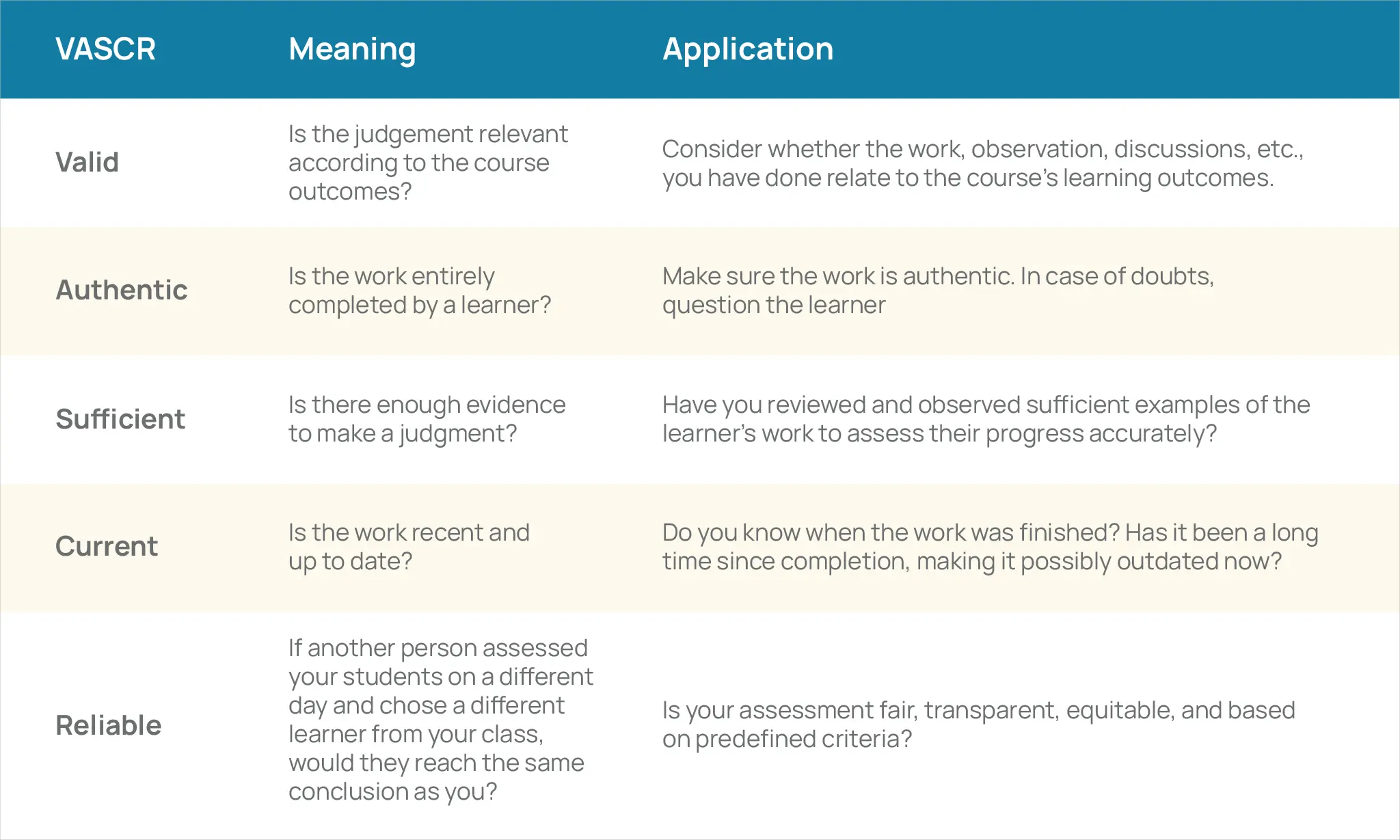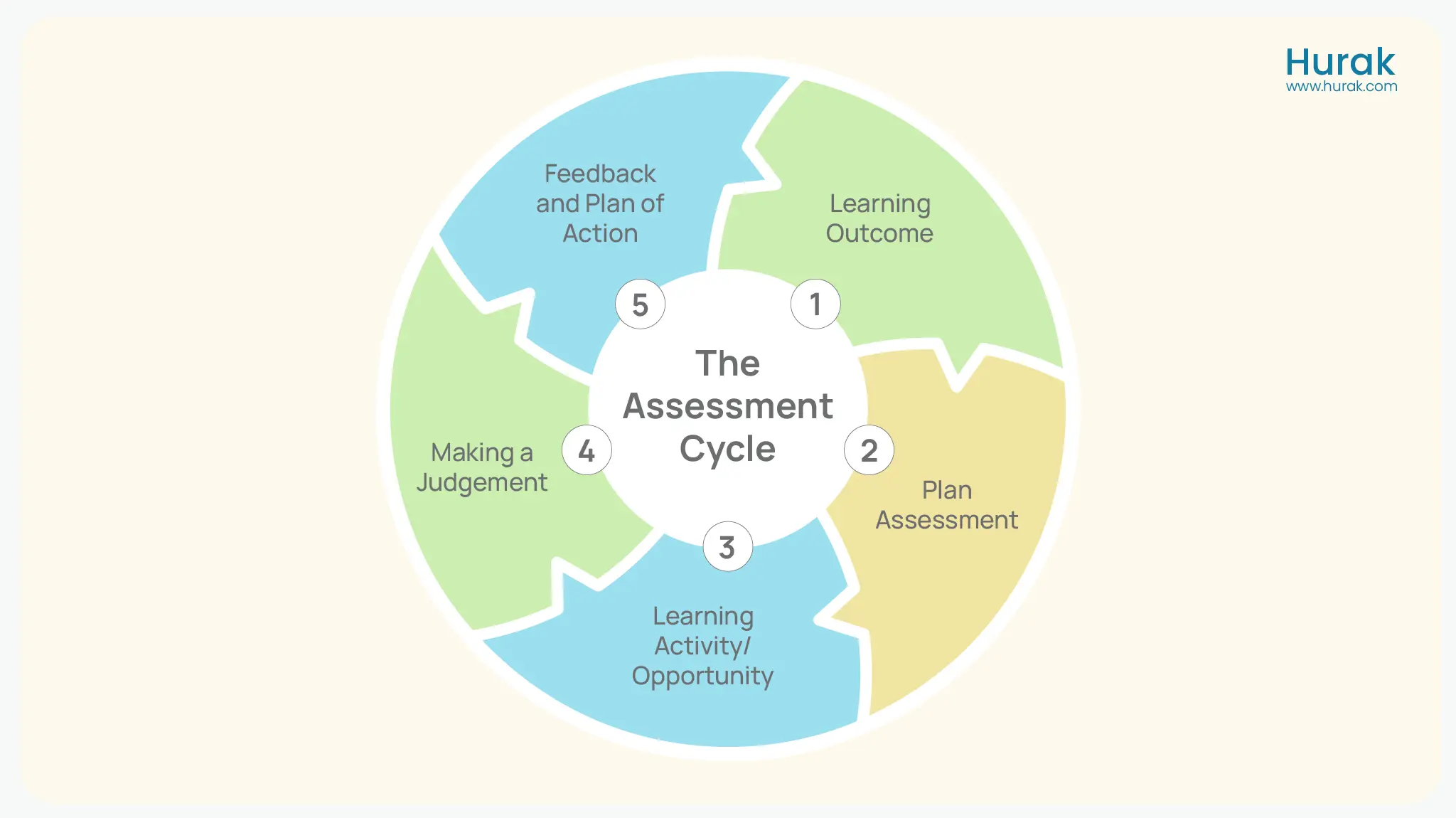Studying the concepts and principles of assessment is important. It helps us understand how assessments work and why they are important. This knowledge confirms that assessments are fair, reliable, and valid.
Knowledge about the concepts and principles improves the quality of assessments and the accuracy of the outcome. It is also useful for evaluating learning effectively.
Importance of Assessment Principles
Assessment principles are important for accurate and ethical learning and development practices. They guide how qualified assessors consistently evaluate learners’ knowledge, skills, and abilities without bias.
Ethical Considerations in Assessment
Ethical principles in assessment include conducting assessments responsibly and ethically. This includes respecting learners’ rights and well-being and avoiding bias or discrimination based on gender, race, disability, or socioeconomic status.
Assessors must promote fairness by designing assessments for diverse learner backgrounds and experiences.
Key Ethical Practices
- Confidentiality: Keeping assessment information private and secure.
- Respect for Diversity: Creating inclusive and respectful assessments of different backgrounds.
- Clear Communication: Providing clear instructions and expectations to learners.
- Objectivity: Maintaining impartiality and fairness throughout the assessment process.
- Validity and Reliability: Using assessment methods that accurately measure what they intend to measure.
By following ethical guidelines, practitioners create supportive learning environments and uphold integrity in assessments.
Transparency is also important. Assessors should openly communicate with learners about assessment purposes, evaluation criteria, potential outcomes, benefits, and available support.
Understanding Concepts and Principles of Assessment
The concepts and principles of assessment are the fundamental ideas and values guiding the assessment process. Key concepts include measuring a learner’s knowledge and learning standards using various assessment types.

The VASCR principles—Validity, Authenticity, Sufficiency, Currency, and Reliability—ensure fair, accurate, and consistent assessments. The Level 3 Certificate in Assessing Vocational Achievement (CAVA) and the Level 3 Award in Understanding the Principles and Practices of Assessment (UPPA Unit 1) allow you to apply these principles effectively in assessment practices.
Benefits of Studying Assessment Concepts and Principles
Studying assessment concepts and principles helps design assessments that accurately measure learner progress and achievements. It promotes effective feedback to motivate and guide learners, improving their learning journey.

The VASCR Principles of Assessment
In assessment, following the VACSR principles—Valid, Authentic, Sufficient, Current, and Reliable—confirms complete fairness and accuracy.
These principles make sure that assessments are genuinely produced by learners, remain relevant, cover all learning outcomes, and show consistency over time.

Validity Principle in Assessment
The Validity Principle is about assessments accurately measuring what they intend to assess—knowledge, skills, or abilities.
Key aspects of the Validity Principle include:
- Content Validity
The assessment’s content aligns with the course or program’s learning outcomes and objectives.
Construct Validity
Examines whether the assessment measures the underlying theoretical construct or concept it purports to measure. This involves demonstrating that the assessment items reflect the intended construct or skill. - Criterion-Related Validity
Determines how well the assessment correlates with an external criterion, such as another established assessment or real-world performance. It includes concurrent validity (how well the assessment compares with a similar assessment simultaneously) and predictive validity (how well the assessment predicts future performance). - Face Validity
Refers to whether the assessment appears to measure what it is intended to measure on the surface.
Valid assessments provide reliable results reflecting a learner’s capabilities, contributing to meaningful and fair evaluations.
Authenticity Principle in Assessment
The authenticity principle confirms that submitted evidence truly belongs to the learners.
In the modern digital age and busy schedules, plagiarising or purchasing coursework from online sources is a temptation. However, submitting work that is not one’s own undermines the purpose of learning and achieving qualifications.
It constitutes plagiarism, cheating, and fraud, which legal authorities and regulatory bodies condemn.
Key aspects of the Authenticity Principle include:
- Originality
Learners must submit work that is their creation and not copied or plagiarised from others, and should consider performing a plagiarism check to ensure authenticity. - Genuineness
The evidence presented should accurately represent the learner’s skills, knowledge, and abilities without falsification or fabrication. - Relevance
The evidence should be directly related to the assessment task and the learning outcomes being assessed.
Proper referencing is essential to acknowledge all sources used, and learners must submit only genuine evidence without fabrication.
How to Verify the Authenticity of the Learner’s Work
- Provide a copy of the learner’s secure email address to send evidence to the assessor.
- Use an individual learner’s login on their e-portfolio system.
- Obtain a learner’s declaration confirming that all portfolio contents are their own.
- Record either a video or audio of the learner confirming the authenticity of their work or participating in an assessment like a reflective discussion.
Sufficiency Principle in Assessment
The Sufficiency Principle requires evidence to directly address learning outcomes and assessment criteria. Assessments accurately gauge learner competence.
For instance, if asked to discuss CPD and reflective practice, focusing only on CPD would not meet the requirements.
In practice, this principle guides the development of assessments based on content breadth and depth.
Key aspects of the Sufficiency Principle include:
- Coverage
The evidence should comprehensively cover all aspects of the assessment criteria and learning outcomes specified for the task. - Depth
The evidence should thoroughly understand and apply the assessed knowledge, skills, or abilities. - Quality
The evidence should be sufficient for accurate assessment and evaluation.
Assessments should include all levels and assessment methods (e.g., written responses and practical demonstrations). Multiple assessment types offer a comprehensive view of learner capabilities.
Using the Sufficiency Principle guarantees fair, valid, and reliable assessments. It allows practitioners to gather evidence, aiding accurate evaluations and tailored learning interventions.
Current Principle in Assessment
Evidence should be recent and dated close to the assessment date. It must be current and
relevant, reflecting present expectations and standards.
Key aspects of the Current Principle include:
- Timeliness
The evidence should be recent and dated close to the assessment date to reflect current knowledge and practices accurately. - Relevance
The evidence should be pertinent and applicable to evaluating assessment criteria and learning outcomes. - Validity
Using current evidence enhances the validity of assessments by ensuring that they accurately measure current competence and understanding.
Outdated qualifications or evidence may not meet current practice guidelines or legislative changes. All evidence should align with expected timelines and represent real-world scenarios.
Reliability Principle in Assessment
The Reliability Principle in assessment refers to the consistency and dependability of assessment results. It confirms that assessments produce consistent outcomes when administered under similar conditions and with similar groups of learners. This consistency allows for reliable judgments about learners’ knowledge, skills, or abilities.
Key aspects of the Reliability Principle include:
- Consistency
Assessments should yield consistent results over time and across different assessors or evaluators. - Repeatability
The assessment process should be repeatable, meaning that if it were conducted again under the same conditions, it would produce similar results. - Precision
The assessment method should measure what it intends to measure accurately and reliably.
Practitioners improve reliability using standardised procedures, clear assessment criteria, and well-defined scoring rubrics. They also avoid potential sources of error, such as bias or variability in scoring, for fair and consistent evaluation of learners.
Structured Approach to Assessment
When beginning any assessment process, consider the VASCR principles: Valid, Authentic, Sufficient, Current, and Reliable. These principles confirm that the evidence collected meets standards and accurately reflects the learner’s capabilities.
You can confidently proceed with the Assessment Cycle if the evidence satisfies these criteria. This cycle involves initial assessment, planning assessments aligned with learning outcomes, engaging learners in relevant activities, etc.

Initial Assessment
Initial assessments aim to understand students’ motivations for joining the course, their prior subject experience, and any learning difficulties or disabilities. This helps determine their starting level. An Initial Skills Assessment aids in accurately grading students.
- Methods and Questions: Choose an initial assessment method to uncover relevant information to guide students towards their learning goals.
Planning the Assessment
Once initial information is gathered, plan how to assess session/course activities aligned with learning outcomes. Communicate assessment criteria to students, making sure they understand expectations.
- Assessment Criteria: Prepare a detailed list of criteria to clarify what students must demonstrate.
- Assessment Methods: Decide on assessment methods such as observation, questioning, or practical demonstrations.
The Learning Activity or Opportunity
Students engage in learning activities where evidence is collected to evaluate progress. This evidence sufficiently demonstrates the application of taught concepts or skills.
- Evidence Gathering: Determine the most effective methods to gather evidence that validates learning in your subject area.
Making a Judgement
Evaluate student progress based on shared criteria. Assessments should be fair, transparent, and unbiased. They should involve students in setting learning goals.
- Judgement Criteria: Use the VASCR (Valid, Authentic, Sufficient, Current, Reliable) principles for comprehensive and accurate assessments.
Feedback & Action Plan
Provide constructive feedback highlighting strengths and areas for development. To avoid overwhelming students, limit feedback to three strengths and three areas for improvement.
- Feedback Delivery: Decide on the method of feedback delivery—whether through conversation, written format, or a structured session.
- Action Plan: Develop an actionable plan outlining steps for improvement so students know how to progress effectively.
This assessment cycle repeats with subsequent assessments or new modules/tasks for continuous improvement and tailored support for each student’s learning journey.
Conclusion
The VASCR principles produce fair, meaningful, and beneficial assessments for learner development. Following these principles of validity, authenticity, sufficiency, current, and reliability improves the credibility of assessment processes and supports learners in achieving their educational goals.




